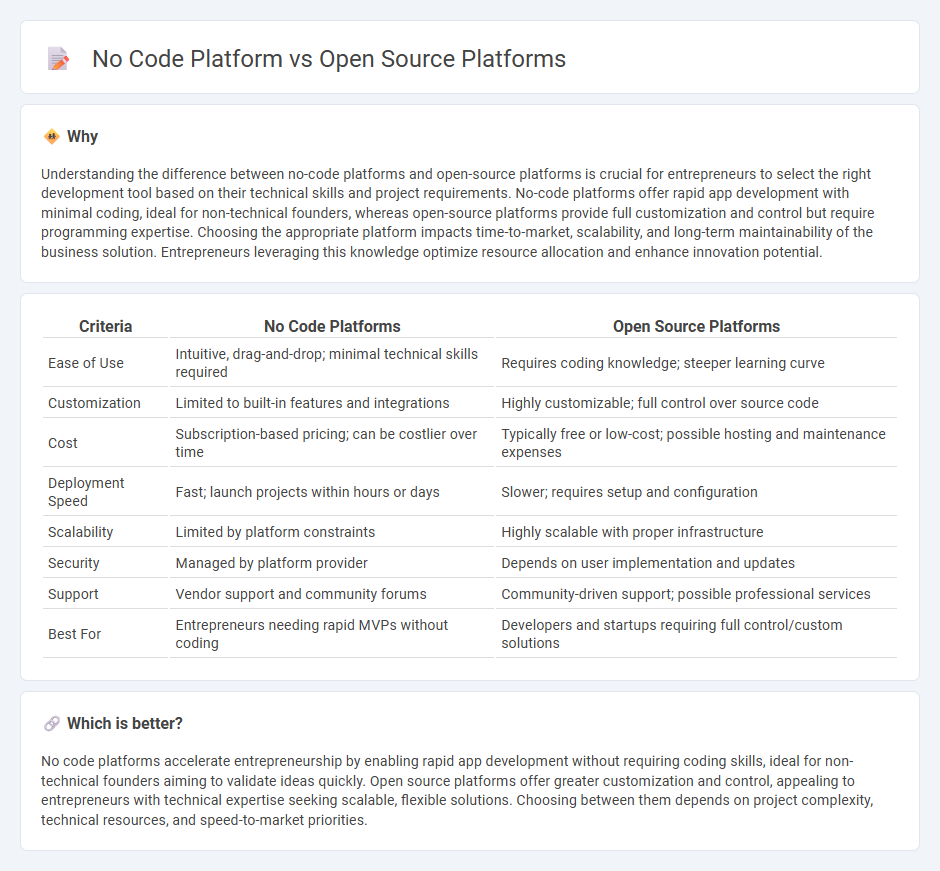
No code platforms empower entrepreneurs to build applications quickly without programming knowledge, accelerating time-to-market and reducing development costs. Open source platforms offer customizable solutions with greater control over software, fostering innovation through community collaboration and transparency. Explore the differences between no code and open source platforms to determine the best fit for your entrepreneurial venture.
Why it is important
Understanding the difference between no-code platforms and open-source platforms is crucial for entrepreneurs to select the right development tool based on their technical skills and project requirements. No-code platforms offer rapid app development with minimal coding, ideal for non-technical founders, whereas open-source platforms provide full customization and control but require programming expertise. Choosing the appropriate platform impacts time-to-market, scalability, and long-term maintainability of the business solution. Entrepreneurs leveraging this knowledge optimize resource allocation and enhance innovation potential.
Comparison Table
| Criteria | No Code Platforms | Open Source Platforms |
|---|---|---|
| Ease of Use | Intuitive, drag-and-drop; minimal technical skills required | Requires coding knowledge; steeper learning curve |
| Customization | Limited to built-in features and integrations | Highly customizable; full control over source code |
| Cost | Subscription-based pricing; can be costlier over time | Typically free or low-cost; possible hosting and maintenance expenses |
| Deployment Speed | Fast; launch projects within hours or days | Slower; requires setup and configuration |
| Scalability | Limited by platform constraints | Highly scalable with proper infrastructure |
| Security | Managed by platform provider | Depends on user implementation and updates |
| Support | Vendor support and community forums | Community-driven support; possible professional services |
| Best For | Entrepreneurs needing rapid MVPs without coding | Developers and startups requiring full control/custom solutions |
Which is better?
No code platforms accelerate entrepreneurship by enabling rapid app development without requiring coding skills, ideal for non-technical founders aiming to validate ideas quickly. Open source platforms offer greater customization and control, appealing to entrepreneurs with technical expertise seeking scalable, flexible solutions. Choosing between them depends on project complexity, technical resources, and speed-to-market priorities.
Connection
No code platforms and open source platforms intersect by empowering entrepreneurs to build and customize applications quickly without deep programming knowledge, reducing development time and costs. Open source platforms provide the foundational tools and frameworks that no code platforms often leverage to enable flexible, scalable solutions. This synergy accelerates innovation and democratizes entrepreneurship by making technology accessible to non-technical founders.
Key Terms
Customizability
Open source platforms provide extensive customizability by allowing developers to access and modify the source code, enabling tailored solutions to specific business needs. No code platforms offer limited customization through predefined templates and drag-and-drop interfaces, ideal for faster deployment but less flexible for complex requirements. Explore deeper insights into how each platform balances ease of use with customization options.
Accessibility
Open source platforms provide unparalleled accessibility by offering customizable code that supports diverse user needs and integration capabilities, making them ideal for developers seeking full control and flexibility. No-code platforms enhance accessibility by enabling non-technical users to create applications through intuitive interfaces without programming knowledge, significantly lowering the barrier to entry. Explore the distinctive accessibility benefits of both platforms to determine the best fit for your project requirements.
Community Support
Open source platforms provide extensive community support through active forums, user-contributed code, and collaborative troubleshooting, benefiting from a global network of developers continuously improving the software. No code platforms offer community support primarily via user forums, tutorials, and customer service, emphasizing ease of use for non-developers but sometimes limited by proprietary restrictions. Explore deeper insights on how community dynamics impact these platforms' effectiveness.
Source and External Links
The ultimate list of 15 best open-source software in 2024 - A curated list of popular open source software including Rocket.Chat, Mozilla Firefox, VLC Media Player, GIMP, and more, highlighting their features and community support.
Open Source Alternatives To Proprietary Software - The largest directory offering 500+ open source alternatives to popular proprietary software such as Godot (game engine), Odoo (business suite), Mastodon (social media), and Grafana (visualization platform).
12 Best Open-Source Software Examples (2025) - Highlights essential open-source platforms like Mattermost, an open-source Slack alternative for real-time messaging and secure collaboration, especially suited for regulated industries or private hosting.
 dowidth.com
dowidth.com